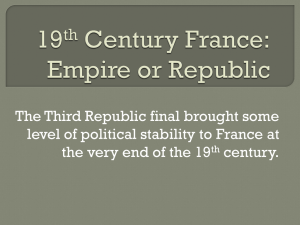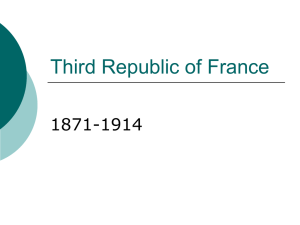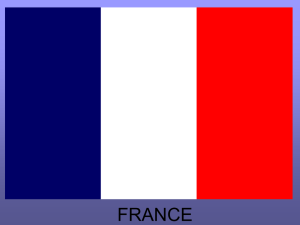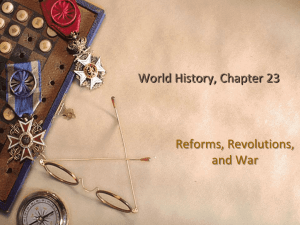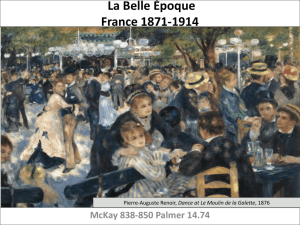C11, S3 - Division & Democracy in France
advertisement
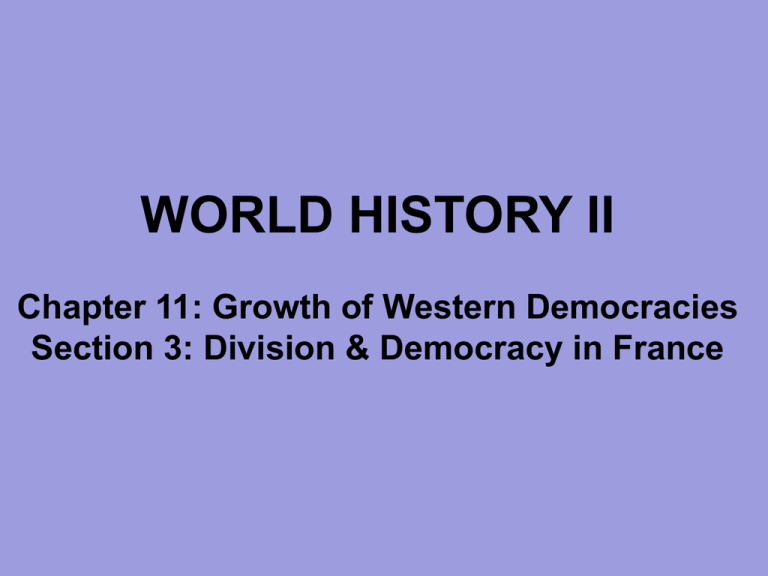
WORLD HISTORY II Chapter 11: Growth of Western Democracies Section 3: Division & Democracy in France Objectives • List the domestic and foreign policies of Napoleon III. • Analyze the impact of the Dreyfus affair and other challenges of the Third Republic. • Describe the French government’s steps toward reform in the early 1900s. What democratic reforms were made in France during the Third Republic? After the Revolution of 1848, Napoleon III proclaimed the Second Empire. Napoleon appealed to many groups in French society. He promised to end poverty, restore past glory, and establish order. At first glance, the government of Napoleon III looked like a constitutional monarchy, but in reality, it was a dictatorship. The National Assembly was elected, but with tight control over candidates. In the 1860s, Napoleon eased up on his control, lifting censorship and even offering a new constitution. France prospered in the mid 1800s. • Napoleon promoted largescale projects, including railroads and urban renewal in Paris. • Workers gained as unions were legalized and education was extended to girls. Ferdinand de Lesseps organized the building of the Suez Canal, which linked the Red Sea to the Mediterranean. Napoleon III had a number of disastrous foreign misadventures. • He attempted to install Maximilian of Austria as ruler of Mexico. • Maximilian was overthrown and shot by Mexican patriots. Even his successes were costly. He gained territory while helping Italian states overthrow Austrian rule, only to have a united Italy emerge on France’s border. Victory in the Crimean War yielded little benefit. In 1870, Otto von Bismarck lured Napoleon into the Franco-Prussian War. After surrounding and starving Paris, the Prussians forced France to surrender. France had to pay a large sum and give Alsace and Lorraine provinces to Germany. With the capture of Napoleon, republicans in Paris proclaimed the Second Empire ended. • A provisional government was set up in Paris. • It evolved into the Third Republic. In 1871 rebels in Paris set up the Paris Commune. • Called Communards, their goal was to save the Republic from Royalists. • Patriots among them dreamed of rejecting the terms of the treaty with Prussia. • Radicals dreamed of establishing a new socialist order. The National Assembly ordered the Communards to disband. • When they refused, troops were sent to restore order. • Civil war raged for weeks. • Buildings were burned and 20,000 Communards died. The Third Republic would last for 70 years. It had two houses: the Senate and the Chamber of Deputies. The Chamber of Deputies was elected by universal male suffrage. The houses chose a president, but the premier had the real power. Many parties formed coalitions to create a government. Coalitions often broke down, leading to new elections. During the 1880s and 1890s France prospered. • France’s war debt to Germany was paid and its overseas empire expanded. • But the government was plagued by political scandal. A minister of war was accused of plotting to against the government. A nephew of the president was caught trying to sell nominations to the Legion of Merit. The worst and most divisive scandal was the Dreyfus Affair. Alfred Dreyfus was accused of spying. Dreyfus didn’t receive a fair trial. He and his defenders were widely condemned and vilified. Even the writer Émile Zola was charged with libel for defending Dreyfus. Later it was proven that Dreyfus was innocent. The Dreyfus Affair split the nation, but the real issue was anti-Semitism. • At his trial, evidence had been hidden. • A new trial was denied even when evidence surfaced that he was innocent. Dreyfus was Jewish at a time when anti-Jewish feeling was on the rise in Europe. Most Jews were poor, lived in ghettos or slums, and were subject to increasing discrimination. Rising antiSemitism led Theodore Herzel to call for a separate Jewish state. Many Jews wanted to escape European prejudice and return to their ancient homeland. Herzel launched modern Zionism, a movement to restore a Jewish homeland in Palestine. In the 1900s reform did come to France. Government support for the Church ended. • Schools were made public and payments to clergy ended. • There was now freedom for all religions. • In 1896, women received control of their own wages. • A French Union for Women’s Suffrage was founded in 1906, though women couldn’t vote until after World War II. By 1914 France was the largest democratic nation in Europe. France was prosperous. It had an overseas empire and a constitution that protected basic rights. But France was itching to avenge its defeat and regain the “lost provinces” of Alsace and Lorraine. What democratic reforms were made in France during the Third Republic? In January 1871, France was forced to surrender to the Germans, ending the Franco-Prussian War. With their surrender, a long period of French domination of Europe ended. From the ashes of Napoleon III’s Second Empire rose the Third Republic. Economic growth, democratic reforms, and fierce nationalism all played a part in shaping modern France.
